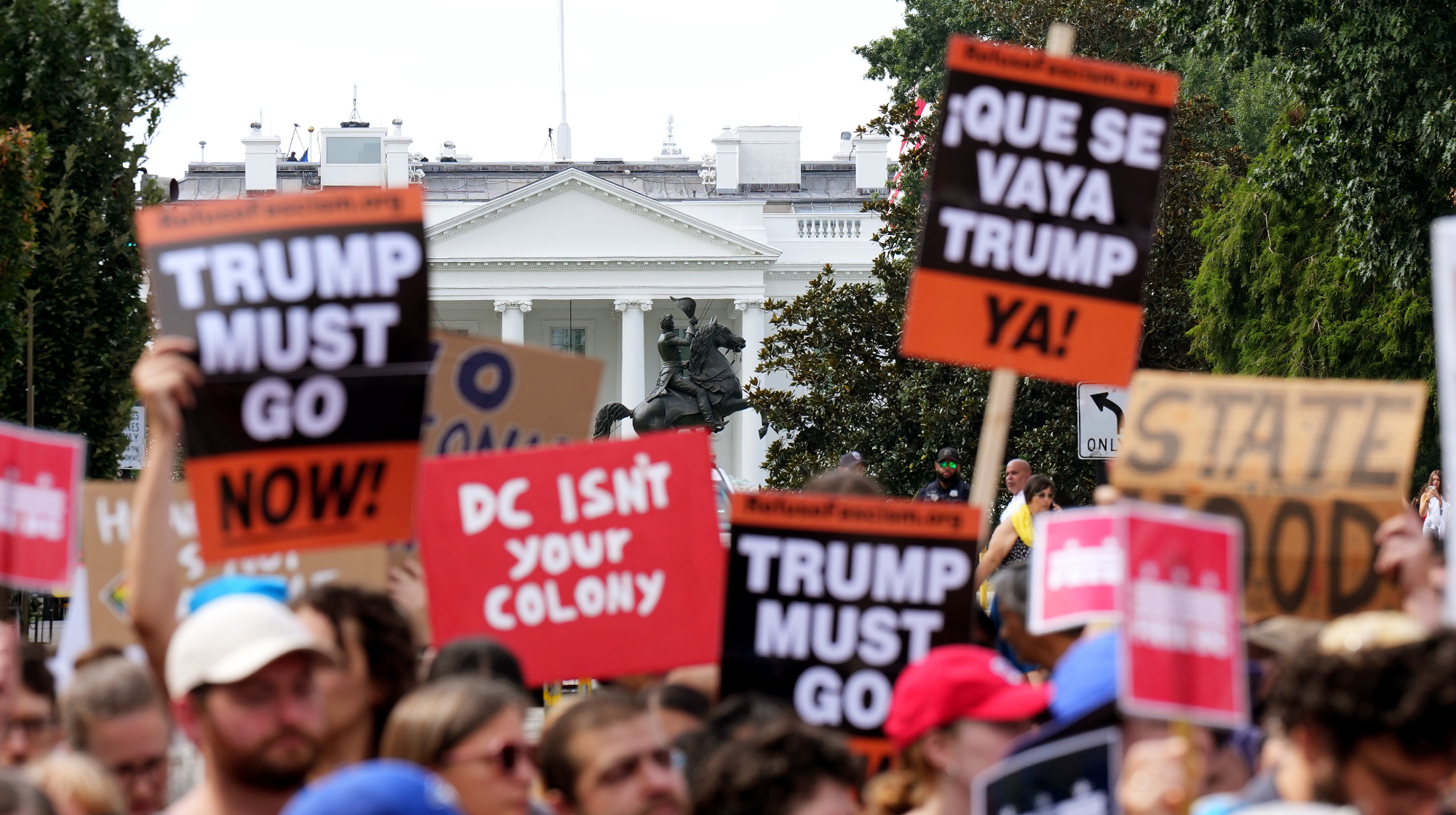Trump takes over DC police, deploys National Guard
The president blames the takeover on rising crime, though official figures contradict this concern


A free daily email with the biggest news stories of the day – and the best features from TheWeek.com
You are now subscribed
Your newsletter sign-up was successful
What happened
President Donald Trump Monday announced a temporary federal takeover of Washington, D.C.'s Metropolitan Police Department and the deployment of 800 National Guard troops to tackle what he called a "situation of complete and total lawlessness" in the capital. D.C Mayor Muriel Bowser called Trump's assumption of emergency powers "unsettling and unprecedented."
Who said what
Trump's federalization of D.C.'s police and the National Guard deployment are an "extraordinary flex of federal power" that "stripped" city leaders of their ability to direct law enforcement and could "expose" Washingtonians to "unpredictable encounters with a domestically deployed military force," The Washington Post said. This wielding of "executive authority in ways with little precedent in modern U.S. history and in defiance of political norms" is "emblematic" of Trump's "second-term approach" to governing, Reuters said.
Trump's "dystopian picture" of a capital city "overrun by violent crime and anarchy" stands "in sharp contrast to official figures" showing violent crime there is "at a 30-year-low," The New York Times said, and many Washington residents are "unlikely to recognize" his depiction.
Defense Secretary Pete Hegseth, standing alongside Trump Monday, "signaled that more National Guard troops could be roped into the deployment down the line," said Fox News. The Army said the Guard members deployed to D.C. would participate in an "array of tasks," including "administrative, logistics and physical presence in support of law enforcement."
What next?
The "previously unused provision" of the District of Columbia Home Rule Act that Trump activated allows him to "take over Washington's police department for up to 30 days if he notifies certain heads of congressional committees," Politico said. Trump also "threatened to expand his efforts to other cities, including Chicago, if they did not deal with crime rates he claimed were 'out of control,'" the Times said. But his "authority to intervene elsewhere would be more limited."
The Week
Escape your echo chamber. Get the facts behind the news, plus analysis from multiple perspectives.

Sign up for The Week's Free Newsletters
From our morning news briefing to a weekly Good News Newsletter, get the best of The Week delivered directly to your inbox.
From our morning news briefing to a weekly Good News Newsletter, get the best of The Week delivered directly to your inbox.
A free daily email with the biggest news stories of the day – and the best features from TheWeek.com
Rafi Schwartz has worked as a politics writer at The Week since 2022, where he covers elections, Congress and the White House. He was previously a contributing writer with Mic focusing largely on politics, a senior writer with Splinter News, a staff writer for Fusion's news lab, and the managing editor of Heeb Magazine, a Jewish life and culture publication. Rafi's work has appeared in Rolling Stone, GOOD and The Forward, among others.
-
 How the FCC’s ‘equal time’ rule works
How the FCC’s ‘equal time’ rule worksIn the Spotlight The law is at the heart of the Colbert-CBS conflict
-
 What is the endgame in the DHS shutdown?
What is the endgame in the DHS shutdown?Today’s Big Question Democrats want to rein in ICE’s immigration crackdown
-
 ‘Poor time management isn’t just an inconvenience’
‘Poor time management isn’t just an inconvenience’Instant Opinion Opinion, comment and editorials of the day
-
 Witkoff and Kushner tackle Ukraine, Iran in Geneva
Witkoff and Kushner tackle Ukraine, Iran in GenevaSpeed Read Steve Witkoff and Jared Kushner held negotiations aimed at securing a nuclear deal with Iran and an end to Russia’s war in Ukraine
-
 Pentagon spokesperson forced out as DHS’s resigns
Pentagon spokesperson forced out as DHS’s resignsSpeed Read Senior military adviser Col. David Butler was fired by Pete Hegseth and Homeland Security spokesperson Tricia McLaughlin is resigning
-
 Judge orders Washington slavery exhibit restored
Judge orders Washington slavery exhibit restoredSpeed Read The Trump administration took down displays about slavery at the President’s House Site in Philadelphia
-
 Kurt Olsen: Trump’s ‘Stop the Steal’ lawyer playing a major White House role
Kurt Olsen: Trump’s ‘Stop the Steal’ lawyer playing a major White House roleIn the Spotlight Olsen reportedly has access to significant US intelligence
-
 Hyatt chair joins growing list of Epstein files losers
Hyatt chair joins growing list of Epstein files losersSpeed Read Thomas Pritzker stepped down as executive chair of the Hyatt Hotels Corporation over his ties with Jeffrey Epstein and Ghislaine Maxwell
-
 Judge blocks Hegseth from punishing Kelly over video
Judge blocks Hegseth from punishing Kelly over videoSpeed Read Defense Secretary Pete Hegseth pushed for the senator to be demoted over a video in which he reminds military officials they should refuse illegal orders
-
 Trump’s EPA kills legal basis for federal climate policy
Trump’s EPA kills legal basis for federal climate policySpeed Read The government’s authority to regulate several planet-warming pollutants has been repealed
-
 House votes to end Trump’s Canada tariffs
House votes to end Trump’s Canada tariffsSpeed Read Six Republicans joined with Democrats to repeal the president’s tariffs
